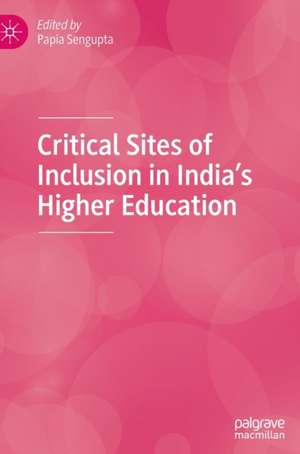Critical Sites of Inclusion in India’s Higher Education
Editat de Papia Senguptaen Limba Engleză Hardback – 2 mar 2022
Higher education is imperative to empowerment in socially stratified societies marred with deep inequalities like India and many other multicultural countries. Disputes over inclusion remains a critical feature in Indian higher education sector, as it is viewed as facilitating access to economic opportunities and providing vertical mobility for individuals belonging to marginalized communities. Higher education empowers, and expands individual horizons of thought and ideas of freedom, dignity, equality, enabling individuals to participate actively in the political-sociological discourses in democratic polity. Therefore, policy makers, political theorists and educationists have been examining the question of inclusion and education as public-good. Contemporary India has witnessed an unprecedented attack on academic freedom, free exchange of ideas and expressions, challenging the very idea of inclusion and inclusiveness.
Preț: 780.82 lei
Preț vechi: 952.22 lei
-18% Nou
Puncte Express: 1171
Preț estimativ în valută:
149.41€ • 155.99$ • 123.66£
149.41€ • 155.99$ • 123.66£
Carte tipărită la comandă
Livrare economică 04-18 aprilie
Preluare comenzi: 021 569.72.76
Specificații
ISBN-13: 9789811682551
ISBN-10: 9811682550
Pagini: 191
Ilustrații: XXIII, 191 p. 14 illus., 13 illus. in color.
Dimensiuni: 148 x 210 mm
Greutate: 0.41 kg
Ediția:1st ed. 2022
Editura: Springer Nature Singapore
Colecția Palgrave Macmillan
Locul publicării:Singapore, Singapore
ISBN-10: 9811682550
Pagini: 191
Ilustrații: XXIII, 191 p. 14 illus., 13 illus. in color.
Dimensiuni: 148 x 210 mm
Greutate: 0.41 kg
Ediția:1st ed. 2022
Editura: Springer Nature Singapore
Colecția Palgrave Macmillan
Locul publicării:Singapore, Singapore
Cuprins
Introduction.- Chapter 1 Negotiating Inclusion: Minority institutions and constitutional-legal dimensions in India.- Chapter 2 From exclusion to inclusion-the case of public madarsa education system.- Chapter 3 Language Conundrum: English language and exclusivity in Indian higher education.- Chapter 4 Invisible voices: the case of endangered languages communities.- Chapter 5 Inclusive education: Analysing the Rights of Persons with Disabilities Act 2016.- Chapter 6 Institutional barriers as hindrance to inclusion of women as members of academic community.- Chapter 7 Higher education and the question of inclusivity for LGBTQIA+ community.- Chapter 8 Interrogating neoliberal rationality and exclusivity of higher education.- Chapter 9 More technology-less access? Decoding ICT compliance in higher education.- Prologue: Placing ‘inclusion’ in the National Education Policy 2020.
Notă biografică
Dr. Papia Sengupta is Assistant Professor at the Centre for Political Studies in Jawaharlal Nehru University, New Delhi, India. She was awarded the Distinguished Teacher award by former President A.P.J. Abdul Kalam in 2009 for her contribution to students’ mentorship. Dr Sengupta was fellow at the Institute for Advanced Studies in Humanities, University of Edinburgh (2016) and Brown University, USA (2015). Her research interests include politics of language, diversity studies, minority rights and decolonization of knowledge, gender and multiculturalism. She has been awarded fellowships from the Shastri Indo-Canadian Faculty Fellowship, Swiss International Development Agency fellowship, Switzerland and the International Institute of Social History fellowship. Her monograph titled Language as Identity in Colonial India: Policies and Politics, was published in 2018. In 2020 the International Association for Applied Linguistics, Netherlands honored her with the Solidarity Award. Dr. Sengupta’s research articles have been published in reputed national and international journals such as Economic and Political Weekly, Social Action, Geoforum and The International Journal on Diversity
Caracteristici
Acquaints the reader to the often invisibilized practices and policies Emphasizes on the complexities of education policies Identifies the challenges to the idea of inclusion
